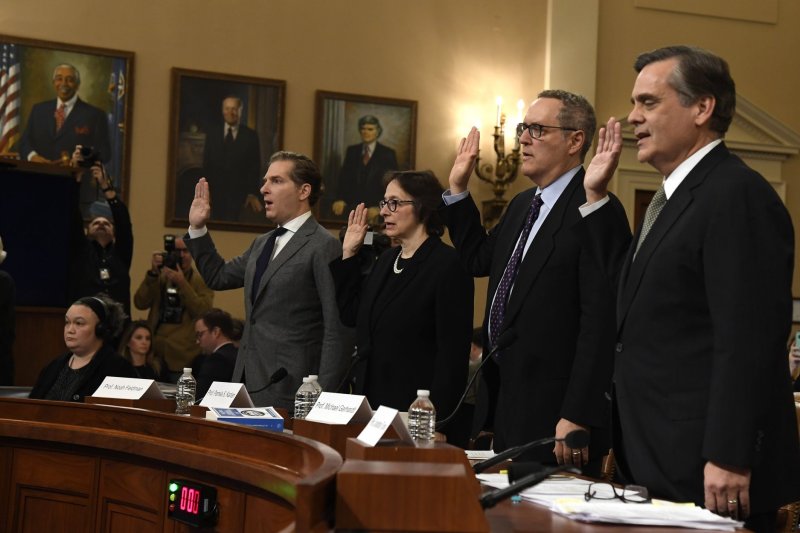1 of 9 | Law professors, from left to right, Noah Feldman, Pamela S. Karlan, Michael Gerhardt and Jonathan Turley are sworn in to testify before the House Judiciary Committee as part of the Donald Trump impeachment inquiry on Wednesday. Photo by Mike Theiler/UPI |
License Photo
Dec. 4 (UPI) -- Four legal experts offered differing opinions Wednesday as to whether President Donald Trump's refusal to comply with congressional subpoenas in the impeachment inquiry is grounds for an obstruction case.
The witnesses -- three called by Democrats and one called by Republicans -- testified before the House judiciary committee starting Wednesday morning.
Their testimony came one day after House Democrats on the intelligence committee released a report accusing Trump of congressional obstruction based on his instructions for White House staff not to comply with subpoenas.
Jonathan Turley, a George Washington University Law School professor, said Democrats' attempts to go after Trump for fighting the subpoenas in court was a congressional abuse of power.
"President Trump has gone ... to the courts," Turley said. "He's allowed to do that; we have three branches, not two.
"If you impeach a president, if you make a high crime and misdemeanor out of going to the courts, it is an abuse of power. It's your abuse of power. You are doing precisely what you're criticizing the president for doing."
But Noah Feldman, a constitutional law expert from Harvard Law School, disagreed with Turley, criticizing Trump's lack of cooperation with the inquiry.
"I don't think it's possible to emphasize this strongly enough. A president who will not cooperate in an impeachment inquiry is putting himself above the law," he said.
"Now, putting yourself above the law as president is the core of an impeachable offense because if the president could not be impeached for that, he would in fact not be responsible to anybody."
Michael Gerhardt, a professor at the University of North Carolina at Chapel Hill, agreed.
Trump's "refusal to comply with those subpoenas is an independent event. It's apart from the courts. It's a direct assault on the legitimacy of this inquiry, which is crucial to the exercise of this power," he said.
At the end of the Wednesday's testimony, White House press secretary Stephanie Grisham said it was "a good day" for Trump and a bad one for Democrats.
"The only thing the three liberal professors established at Chairman [Jerrold] Nadler's hearing was their political bias against the president," she said in a statement.
"It did nothing to change the fact that, despite weeks of hearings in this sham process, the president did nothing wrong. Congress should get back to working for the American people. The United States-Mexico-Canada trade agreement, infrastructure, and drug pricing all await action from Speaker [Nancy] Pelosi. Instead, House Democrats continue to ignore their constituents by focusing on this pathetic and desperate charade."
In his prepared remarks, Turley contended the case against Trump was "thin" and warned that a finding to impeach Trump would set a damaging precedent for future U.S. presidents.
"If the House proceeds solely on the Ukrainian allegations, this impeachment would stand out among modern impeachments as the shortest proceeding, with the thinnest evidentiary record and the narrowest grounds ever used to impeach a president," Turley wrote. "That does not bode well for future presidents who are working in a country often sharply and, at times, bitterly divided."
Three other legal and constitutional scholars called by Democrats, however, each made cases about why impeaching the president was justified.
Gerhardt said Trump's "misconduct is apparent" and included impeachable offenses such as obstruction of justice, obstruction of Congress and bribery.
Another Democratic witness, Pamela Karlan of Stanford Law School, issued an opening statement in which she said the evidence shows Trump delayed providing foreign military assistance meant to limit "Russian aggression" in order to "strong-arm a foreign leader into smearing" one of his domestic political opponents.
Feldman said the evidence meets the constitutional threshold for "high crimes and misdemeanors" and amounted to a "corrupt abuse of the power of the presidency."
Wednesday's hearing comes a day after the House intelligence committee voted to approve a report accusing Trump of obstructing the impeachment probe and asking Ukraine to interfere in the 2020 presidential election.
The committee based the report on weeks of private and public testimony from more than a dozen diplomats and other officials. Democrats said there is sufficient evidence to suggest the Trump administration threatened to withhold $250 million in congressionally approved military aid to Ukraine in exchange for investigations of Democratic presidential candidate Joe Biden and his son Hunter Biden by the government in Kiev.
Republicans on the intelligence committee released their own report a day earlier, which defended Trump's decision to withhold the aid to Ukraine -- saying it was based on reasonable skepticism due to the country's history of corruption. Administration officials and Trump, who ultimately released the aid in September, have repeatedly said they held up the payment due to concerns about how it would be used by President Volodymyr Zelensky's government.
In London for NATO's 70th anniversary summit on Tuesday, Trump dismissed the impeachment proceedings as a hoax.
"If you look at impeachment, the word impeachment, here there was nothing wrong, nothing done wrong," he said.
Rep. Gerry Connolly, D-Va., said Rep. Jerrold Nadler, D-N.Y., is "more than up to the task" of leading the next phase of the impeachment proceedings.
"Jerry Nadler is in his own right a constitutional scholar," Connolly said. "He specializes here in constitutional law, and he's a very measured person in terms of parsing through issues and looking at them through a very disciplined mind, and he will bring that kind of legal temperament to the task at hand."















